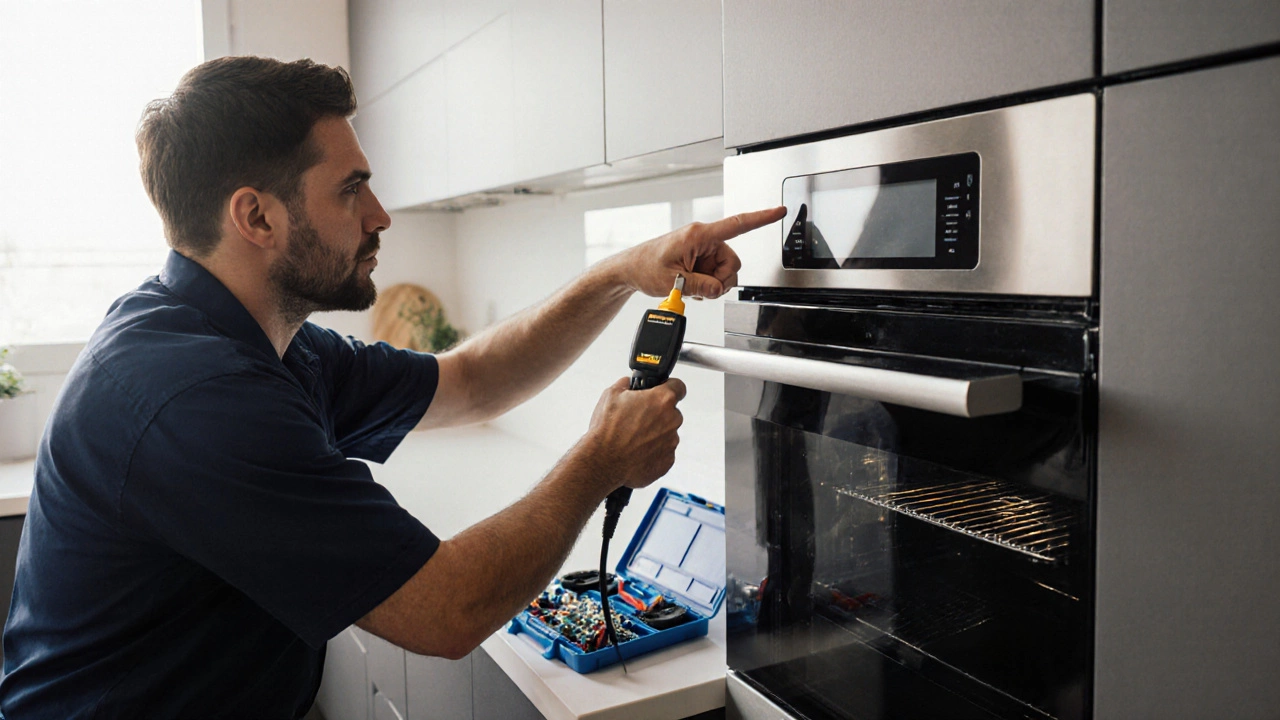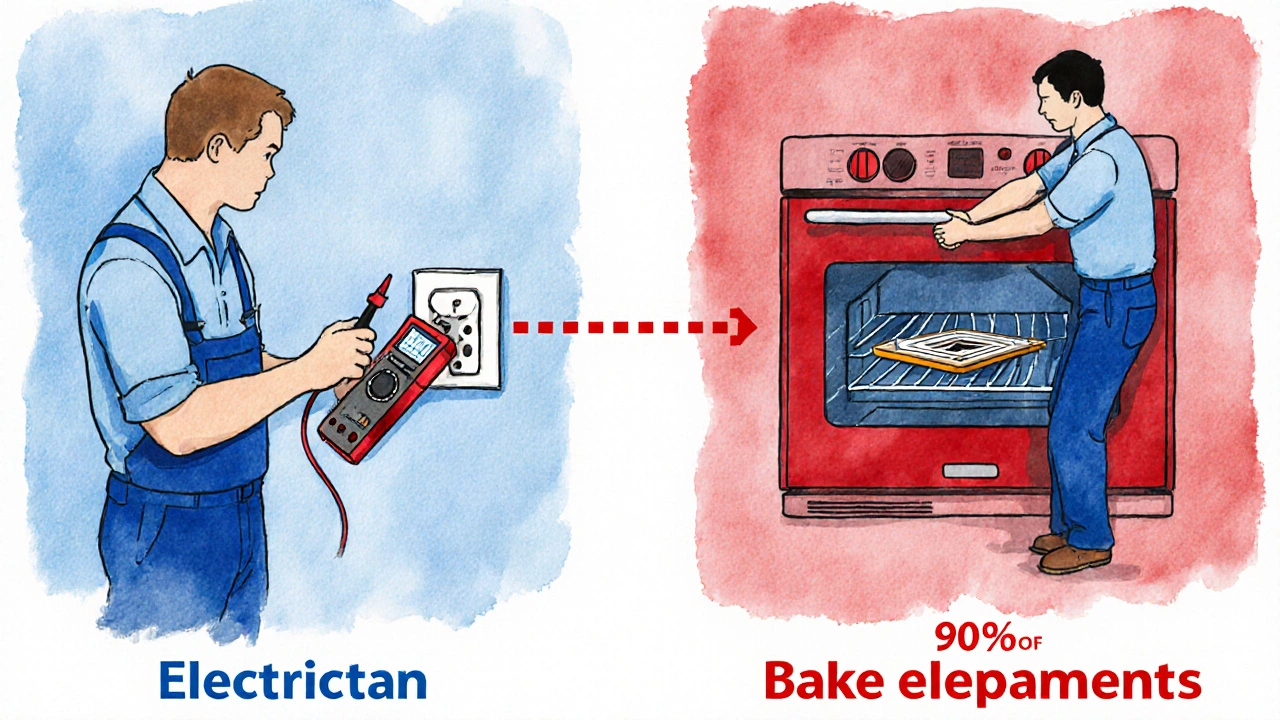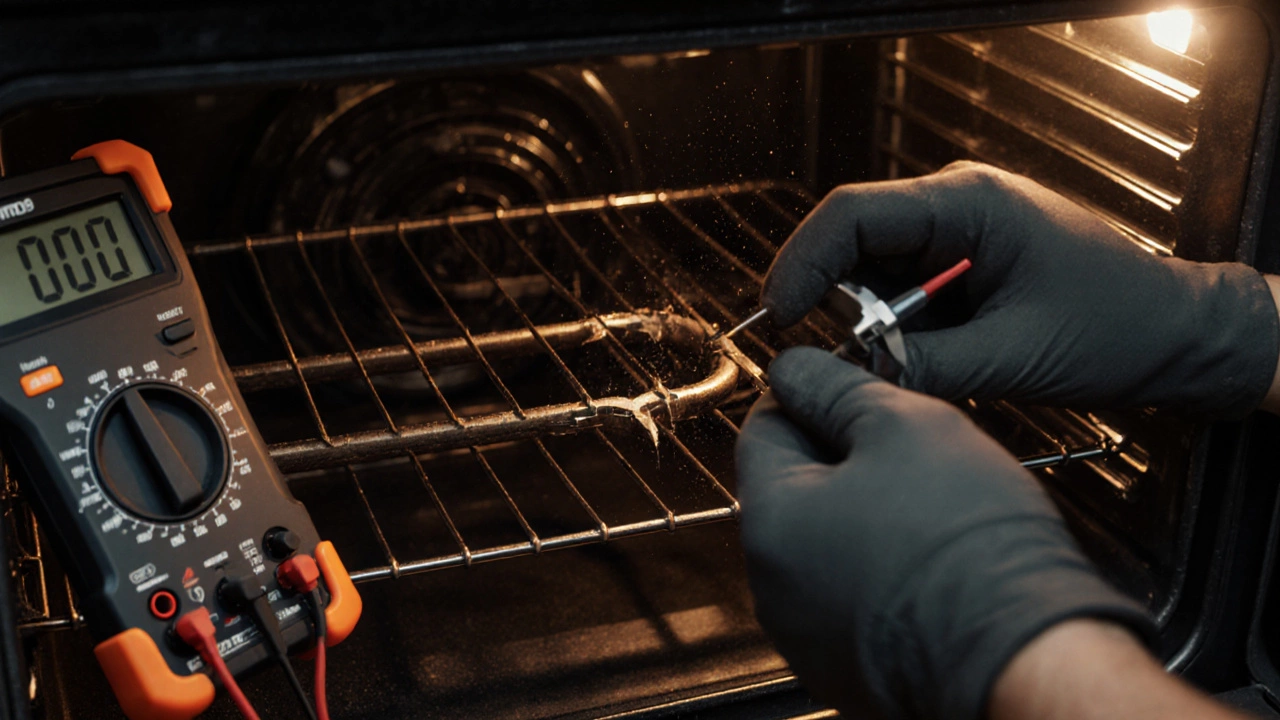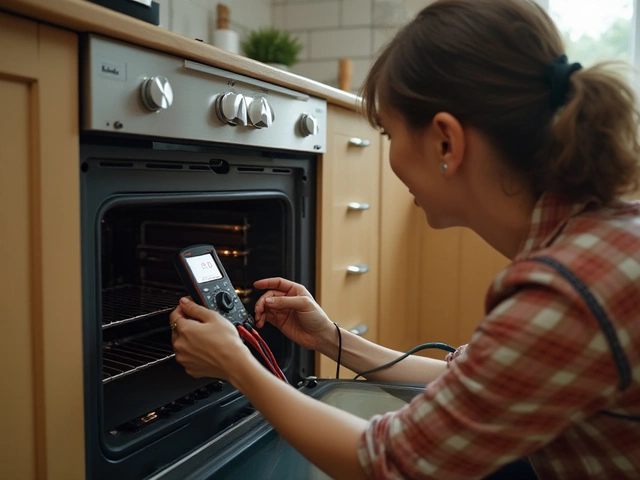If your electric oven stops heating, the display goes dark, or it trips the circuit breaker, you might wonder: can an electrician repair an electric oven? The short answer is yes-but not always the best choice. Many people assume electricians handle all things electrical, including appliances. But when it comes to ovens, the line between electrical and appliance repair gets blurry fast. Knowing who to call can save you time, money, and frustration.
Why an Electrician Might Not Be the Right Call
Electricians are trained to work with wiring, circuits, panels, and safety systems in homes. They know how to run new lines, fix faulty breakers, and ensure your house meets electrical codes. But an electric oven isn’t just a plug-in device-it’s a complex appliance with heating elements, thermostats, control boards, door switches, and sensors. These parts don’t usually fail because of bad wiring. They fail because they’re worn out, overheated, or defective.For example, if your oven won’t heat up, the problem is more likely a broken bake element (a $50 part) than a tripped circuit. An electrician might check the voltage at the outlet and say everything looks fine. Then they’ll hand you a bill for an hour’s work and send you to a technician anyway.
Most electricians don’t carry oven parts. They don’t have the diagnostic tools to test a control board or calibrate a temperature sensor. They’re not trained to open the oven cavity, test continuity on heating elements, or replace a faulty relay. That’s appliance repair territory.
When an Electrician IS the Right Choice
There are times when calling an electrician makes perfect sense. If your oven suddenly stopped working and your other appliances on the same circuit are also dead, the issue could be a tripped breaker, a blown fuse, or a faulty 240V outlet. An electrician can test the voltage at the outlet and confirm if you’re getting the full 240 volts needed for the oven to run. In older homes, especially those with knob-and-tube wiring, the circuit might be overloaded or improperly installed.Another common scenario: you’re installing a brand-new electric oven and the wiring doesn’t match. Maybe your home has a 3-prong plug but the new oven requires a 4-prong. Or the circuit breaker is undersized. That’s when you need an electrician. They can upgrade the circuit, install a new outlet, or rewire the junction box to meet modern safety standards.
Also, if your oven is sparking, smoking, or smells like burning plastic, don’t try to fix it yourself. Even if the issue is internal, an electrician can safely shut off the power and confirm whether the problem is electrical (like a shorted wire) or mechanical (like a failed element). In those cases, they might call in an appliance technician-or advise you to replace the unit if it’s unsafe.
What Appliance Technicians Do That Electricians Don’t
Appliance repair technicians specialize in the inner workings of ovens, stoves, fridges, and washers. They carry a full toolkit: multimeters for testing components, thermocouples for checking heat sensors, and a stock of common replacement parts. They know how to read error codes on digital displays, test door latch switches, and replace control boards without damaging the oven’s finish.For instance, if your oven displays an “F3” error code, that usually means a temperature sensor failure. An appliance tech will locate the sensor inside the oven cavity, unplug it, and test its resistance. If it reads outside the normal range (typically 100-110 ohms at room temperature), they swap it out. An electrician wouldn’t know where to find the sensor or how to interpret the code.
They also handle gas-electric hybrids. Even if your oven runs on electricity, it might have a gas broiler or a self-cleaning system that requires knowledge of both systems. Appliance techs are trained for this. Electricians aren’t.

Cost Comparison: Electrician vs. Appliance Technician
Here’s what you’re likely to pay in New Zealand as of 2025:
| Service Type | Call-Out Fee | Hourly Rate | Typical Repair Cost (Parts + Labor) |
|---|---|---|---|
| Electrician | $80-$120 | $90-$130/hour | $150-$300 (if wiring issue) |
| Appliance Technician | $60-$90 | $70-$100/hour | $120-$250 (for element, sensor, or control board) |
Notice something? The appliance tech charges less and fixes the actual problem more often. An electrician might spend 45 minutes checking the outlet, then charge you for the time even if the oven just needs a new heating element. An appliance tech shows up with the part, diagnoses the issue in 15 minutes, and replaces it on the spot.
What to Do When Your Oven Stops Working
Don’t panic. Follow this simple checklist before calling anyone:
- Check if the oven is plugged in and the circuit breaker hasn’t tripped.
- Try another appliance on the same outlet (like a toaster). If it doesn’t work, the issue is likely electrical.
- Look at the display. Does it show an error code? Write it down.
- Listen for clicks or humming when you turn the oven on. No sound? Could be a control board or power issue.
- Smell anything burning? Turn off the power at the breaker immediately.
If the breaker trips again after resetting, or the outlet has no power, call an electrician. If the oven has power but won’t heat or displays an error code, call an appliance technician. Most reputable appliance repair companies offer same-day service and will come out even on weekends.
Common Oven Problems (and Who Fixes Them)
Here’s a quick guide to the most common oven failures:
- Oven won’t heat at all → Likely a failed bake element or control board. Appliance tech.
- Oven heats unevenly → Faulty thermostat or calibration issue. Appliance tech.
- Display is blank → Power supply or main control board. Appliance tech.
- Trips breaker when turned on → Short circuit or overloaded wiring. Electrician first, then appliance tech if wiring is fine.
- Self-clean function doesn’t work → High-temp sensor or door lock mechanism. Appliance tech.
- Door won’t close or latch → Broken hinge or door switch. Appliance tech.
Bottom line: 9 out of 10 oven problems are appliance issues-not electrical ones. Calling an electrician first is like calling a plumber to fix your washing machine’s spin cycle. They might help, but they’re not the right tool for the job.

When to Replace Instead of Repair
Repairing an oven makes sense if it’s under 10 years old and the part costs less than half the price of a new one. But if your oven is 15+ years old, has multiple failing components, or uses outdated technology (like analog dials and no digital display), replacement is smarter.
New electric ovens in 2025 are more energy-efficient, with smart features like Wi-Fi control, auto-cleaning, and precise temperature sensors. A new mid-range oven costs between $1,200 and $2,000. If your repair quote is over $600 and your oven is older than 12 years, it’s time to upgrade.
Some appliance repair companies even offer trade-in discounts. Ask if they handle disposal and installation. That way, you’re not left with a broken oven and no way to cook dinner.
Final Advice: Know Your Options
You don’t need to be an expert to fix your oven-but you do need to know who to call. If the problem is clearly electrical (no power, tripped breaker, faulty outlet), call an electrician. If the oven has power but doesn’t work right, call an appliance technician. Don’t waste time or money going to the wrong person.
Keep your oven’s manual handy. Most include troubleshooting guides and error code meanings. Take a photo of any error codes before calling. It saves time and helps the technician arrive prepared.
And remember: if you’re unsure, call an appliance repair company first. They’ll tell you if they need an electrician to come along. Most offer free diagnostics over the phone. You’ll save yourself the hassle of two service calls-and get your oven working again faster.
Can an electrician fix a broken oven element?
Technically, yes-but they rarely do. Replacing a bake or broil element requires removing the oven’s interior panels, testing continuity, and reconnecting wires safely. Appliance technicians do this daily and carry the parts. Electricians usually don’t. If you call an electrician for this, they’ll likely refer you to an appliance repair specialist anyway.
Why does my electric oven trip the circuit breaker?
This usually happens when a heating element shorts out, the wiring insulation is damaged, or the oven draws too much current. First, check if the breaker trips only when the oven is on. If yes, the problem is likely internal to the oven. If it trips even when the oven is off, the issue could be faulty wiring or an overloaded circuit. Start with an appliance technician. If they find no internal fault, then call an electrician to check the circuit.
Is it cheaper to repair or replace an electric oven?
If your oven is under 10 years old and the repair costs less than $500, repairing it usually makes sense. Common fixes like replacing a heating element ($120-$200) or thermostat ($150-$250) are cost-effective. But if your oven is older than 12 years, or if multiple parts are failing (e.g., control board + element + sensor), replacement is often cheaper in the long run. New ovens are more efficient, safer, and come with warranties.
Can I repair my electric oven myself?
Some simple fixes are safe for DIYers-like cleaning the oven, checking the power cord, or resetting the breaker. But opening the oven to replace elements, sensors, or control boards involves high voltage and requires technical knowledge. If you’re not experienced with electrical appliances, it’s risky. A mistake can cause a fire, damage the unit further, or void your warranty. Leave internal repairs to certified technicians.
How long does an electric oven usually last?
A well-maintained electric oven typically lasts 13 to 15 years. Factors like usage frequency, cleaning habits, and voltage stability affect lifespan. Ovens in households that bake daily or use the self-clean function often wear out faster. Signs your oven is nearing end-of-life include inconsistent temperatures, frequent error codes, and longer preheat times.
Do I need a licensed technician to repair my oven?
In New Zealand, there’s no legal requirement for oven repair technicians to be licensed-unlike gas appliance work. But reputable companies employ technicians certified by appliance manufacturers or trade bodies like the Electrical Workers Registration Board (EWRB) for electrical safety. Always ask for proof of training and check reviews. A licensed electrician is required only if you’re modifying the home’s wiring or outlet.
Next Steps: What to Do Today
If your oven isn’t working, don’t wait until you’re out of meals. Check the breaker and error codes now. If you’re unsure, call an appliance repair company-they’ll give you a free phone diagnosis. Most offer same-day service in Wellington and other major cities. Keep your oven’s model number handy; it helps them identify the right parts fast.
And if you’re considering a new oven, look for models with energy ratings of A+ or higher. They use 20-30% less power than older units. That saves money every month-and helps reduce your carbon footprint.





